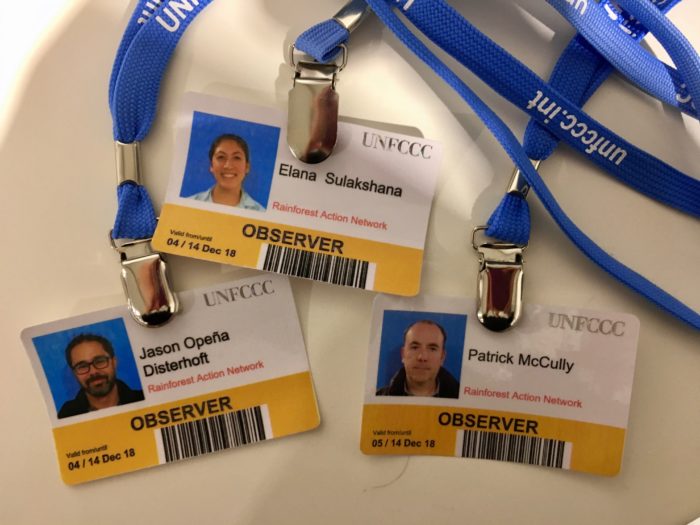Three of us from RAN’s climate and energy team––Paddy, Jason and myself––have just arrived in Katowice, a small city in the heart of Polish coal mining country for COP24, the 2018 United Nations climate talks. The city is hosting nearly thirty thousand visitors, as heads of state, environmental ministers, lobbyists, researchers, and activists are making their way to southern Poland for the conference, the most important climate meeting since the Paris talks in 2015.

You may remember all the buzz around COP21 three years ago. With the Kyoto Protocol expiring, almost every nation in the world came together around the Paris Agreement––pledging to pursue a goal of limiting warming to 1.5ºC. The overall rulebook of the agreement was not hashed out in Paris, and that unfinished business is at the heart of the talks here this year: questions like how to standardize emissions reductions plans (or Nationally Determined Contributions in UN jargon speak), what the key metrics for reporting on emissions reductions should be, and who is responsible for financing new technologies in developing countries.
The conference is taking place in the midst of a global groundswell of for climate action. In October, the Intergovernmental Panel on Climate Change (IPCC) published a report detailing how hugely destructive 2ºC of warming would be, and what it will take to limit warming to 1.5ºC: global carbon emissions have to fall by about 45% below 2010 levels by 2030, reaching zero around 2050. Even the International Energy Agency (IEA), a notoriously pro-fossil fuel think tank, gets it. As we noted on our blog last week, the IEA’s executive director is now on record saying that “We have no room to build anything that emits CO2.”
These numbers have caught the world’s attention and galvanized unprecedented action. Tens of thousands of youth are striking from school in Australia over the Adani Carmichael coal mine, and across the U.S., young people are flooding the offices of their congressional representatives calling for a Green New Deal. In the U.K., thousands are blocking bridges and roads in an Extinction Rebellion. Despite this clear mandate to keep fossil fuels in the ground, governments, corporations, and financial institutions––not just fossil fuel companies!––are continuing to support the expansion of coal, oil, and natural gas.
Take the case of this conference. As the New York Times has reported, co-sponsors of COP24 include Polish coal companies, and Polish exhibits here promote the wonders of coal. You’ll be unsurprised to learn, then, that the Polish government is actively expanding coal mining and constructing new coal-fired power plants. And, as we reveal in a briefing paper published this week, they wouldn’t be able to do so without the financial backing of JPMorgan Chase––and other international banks and insurers.
RAN is here at COP24 to highlight the role of financial institutions in the unconscionable expansion of coal and fossil fuels in general. Governments and fossil fuel companies rely on banks for the financing of projects and insurance companies to offload the risks related to construction, operation, natural disasters, and anything else that may threaten this infrastructure. Banks and insurance companies are crucial elements of the fossil fuel supply chain, without which the physical infrastructure cannot be built and carbon cannot be extracted and combusted. Yet, as these companies fund and insure carbon-intensive projects that are not compatible with a 1.5ºC world, they proclaim their sustainability on panels next to government ministers and release reports on how they’re working to address the Sustainable Development Goals.
This week at COP24, we are hosting and participating in a series of events to expose the practices of banks and insurance companies, while amplifying the voices and demands of communities resisting coal and other fossil fuel expansion on the ground. Here are a couple of things we’re highlighting:
- JPMorgan Chase & Polish Coal: With our Polish partners Fundacja RT-ON, we dove into the financial records and investigated JPMorgan Chase’s role in funding Energa, a Polish state-owned utility company that plans to build a notorious new coal-fired power plant called Ostrołęka C. We explore how Chase is exploiting a loophole in their coal policy to provide a lifeline to the Polish coal industry, despite the industry’s environmental destructiveness and dire financial situation. Check out the full briefing in English and Polish on our website.
- Lagging US Insurance Companies: On Monday, we and our allies launched the 2018 Insurance Scorecard, a report on the role of insurance companies in insuring and investing in coal and tar sands. The takeaway: as European companies shift away from coal, US companies are enabling coal expansion and undermining global efforts to stop climate change. With the US-based Insure our Future coalition, we’ll be calling on US insurers to step up and take action, including vowing to stay away from Adani’s Carmichael coal mine in Australia.
Follow our adventures at COP24 as we demand that banks and insurance companies align their policies and practices with a 1.5ºC world that respects human and indigenous rights. We’ll be reporting live on RAN’s Facebook, twitter, and Instagram.
###
